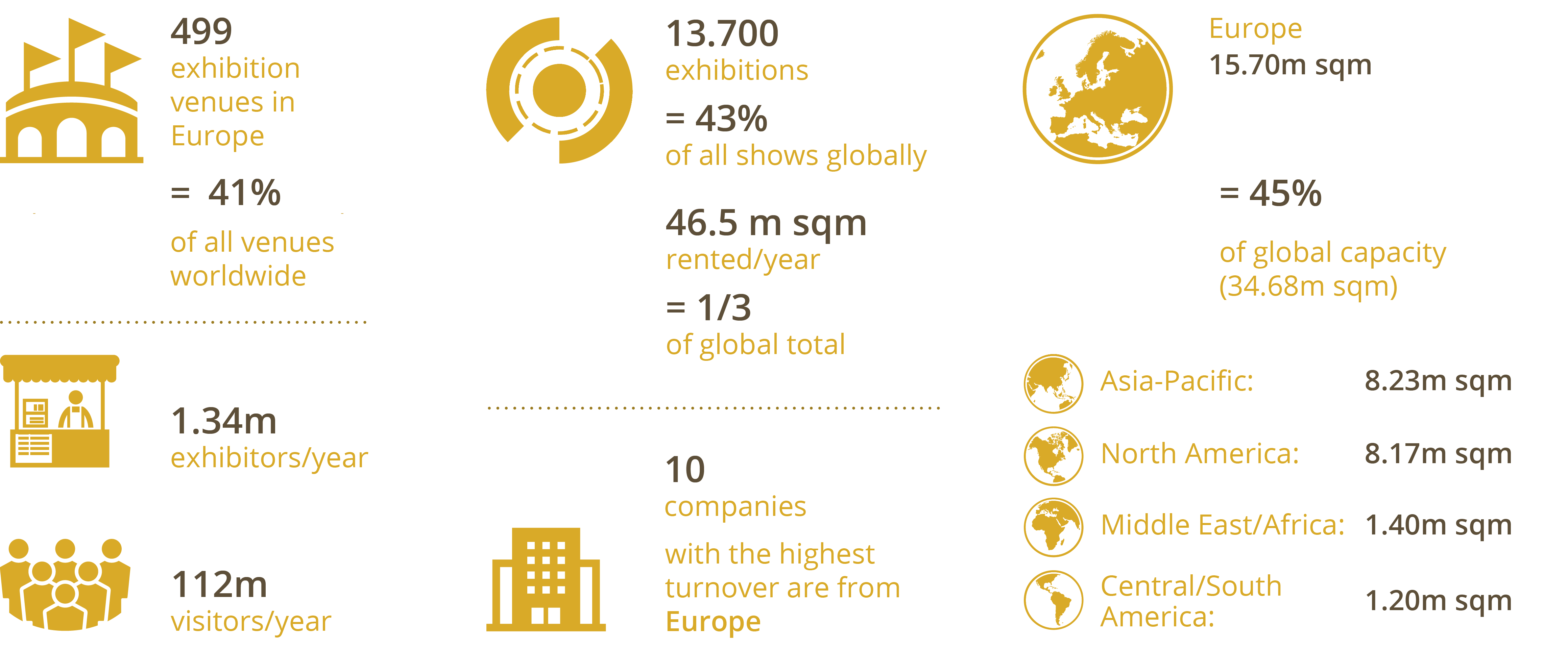PRE PANDEMIC STATE OF THE INDUSTRY
The European exhibition industry is a global leader in terms of venue capacity, quality and turnover.
Europe represents nearly half of the market share of the total exhibition industry and hosts the majority of all leading international B2B and B2C trade fairs.
For our industry to continue to lead and innovate, we need favourable economic and political conditions, a strong Internal Market, a level playing field in Europe, fair competition rules and free trade.

ENHANCING TRADE
The European exhibition industry facilitates trade at all levels by enabling businesses to build trust in face-to-face interactions and by providing high level B2B and B2C meetings which lead to new deals.
With most worldwide leading exhibitions taking place in Europe, European trade fairs attract businesses from within the EU and all around the world.
They provide a maximum number of business opportunities in one place, enabling EU companies to avoid travelling outside the EU to meet potential business partners and customers.
Companies encounter a global offer of goods and services in one single international event on their doorstep.
At the same time, European exhibition organisers bring European exhibition quality outside Europe by organising trade fairs worldwide. This supports the internationalisation of businesses into global growth markets.
Thanks to trade agreements, imports and exports have increased over recent years, helping European companies access new opportunities worldwide. This is the reason why we need open markets and rule-based multilateralism. Fair and stable conditions are also key to attract buyers from third countries and enable European exhibition organisers to access and invest in emerging markets.
BOOSTING INNOVATION AND COMPETITIVENESS
Innovation is vital for Europe’s competitiveness in the global economy. European exhibitions create the perfect setting to boost innovation by offering a condensed overview of novelties, insights on R&D and key industry trends.
It is essential for businesses to stay up to date with cutting-edge technologies that will drive their industry forward in today’s competitive environment. Exhibitions enable businesses and research institutions to evaluate the potential of their innovations by demonstrating their products and services, saving significant time to put them on the market. We provide platforms for European and international competitors to meet in one venue, exchanging and experiencing direct competition first hand. We therefore help to create a culture of entrepreneurship focused on risk-taking and innovation which helps make Europe more competitive on the global scene.
Additionally, we support companies to protect their products and prevent counterfeits by providing “Exhibition Priority Certificates” which are recognised by National Patent and Trademarks Offices.
For our industry to adapt to the fast changes that digitisation demands and fully seize the opportunities it offers, policymakers should not impose overly restrictive rules and obligations on new technologies. Our industry also needs a more digitally skilled workforce which requires increasing the number of apprenticeships and students in this field.
EMPOWERING SMES
Small and Medium Enterprises (SMEs) are the backbone of Europe’s economy, representing 99% of all companies operating in the EU. SMEs represent the highest share of our exhibitors.
European exhibitions represent the most efficient and cost-effective marketing tool for SMEs. We help them build more business contacts in a limited period and at minimal cost. We provide a platform for their potential business partners and customers to experience their products and services.
European exhibitions enable SMEs to access new markets and generate growth outside the EU by offering them the internationally leading sector exhibitions at their doorstep where the most influential international buyers are keen to discover their products. Our industry also paves the way for SMEs to access growing markets worldwide by organising exhibitions abroad and taking European companies to these target regions.
By empowering SMEs to develop their activity both within and outside Europe, our industry represents an important asset for them to increase their internationalisation and access third markets.
While we welcome the European Union’s strategy aimed at helping SMEs expand their business outside the EU, we suggest to increase funding to also support exhibition organisers who provide the platforms where companies take their first steps into internationalisation.
Considering their expertise on the field, exhibition organisers should be included into the eligible proposers for all relevant programmes. Funding for targeted services like tailor made exhibition matchmaking and hosted buyers programmes would increase the positive effects for SMEs to expand their business.

Our industry substantially contributes to regional development by generating social and economic benefits.
We generate direct, indirect and induced gains and contribute to Europe’s economy with jobs and growth in various sectors such as business tourism, transportation, manufacturing, construction and hospitality.
The exhibition venues generate a pole of economic activities that facilitate the development of infrastructures and contribute to the development of the areas where exhibitions take place.
EMBRACING SUSTAINABILITY
Sustainability is integrated into all our activities. Sustainability and, in a larger sense Corporate Social Responsibility, is a must for our industry and our customers.
Most of the European venues and exhibitions hold certification. The venues invest into refurbishing to make them more energy efficient. Many generate their own energy and/or use renewable energy. They also strive for more efficiency in day-to-day activities by improving logistics for set-up and dismantling, and by reducing waste and increasing recycling following an overarching goal of limiting their environmental footprint in everything they do. Meeting multiple business partners in one location substantially reduces business travel for exhibitors and visitors compared to individual encounters which saves a considerable amount of time.
Exhibitions encompass all sectors of business, government and civil society, as a large value chain of partners and stakeholders work together to organise them. With such a wide audience and reach, the exhibition industry can have
a meaningful collective impact.
MORE INFORMATION ABOUT THE EXHIBITION INDUSTRY